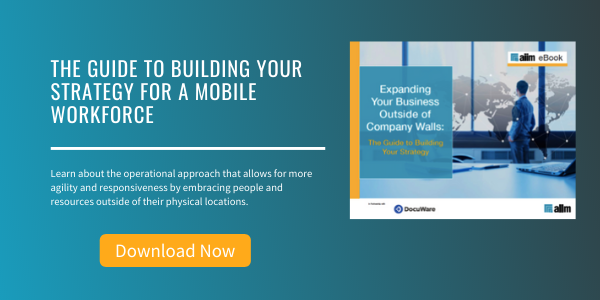
8 Ways Mobile Computing Can Make You More Collaborative and Connected
Cloud | Collaboration | Mobile
The boundaries of today's organizations are more fluid than ever before - we collaborate with an expanded ecosystem of partners, vendors, and customers, and we need to be able to do this whether we're in the office, at home, or on-the-go. This loosely defined, increasingly mobile workforce is made possible by rich, enabling technologies such as near-ubiquitous internet access, sophisticated mobile devices, and web-based, interconnected software platforms that connect people to their content, contacts, and tools regardless of location.
To highlight how far we've come in the last few years, let's look at eight ways we can use mobile devices and applications to enhance productivity in our business. Consumed together, these services can help realize the vision of a truly mobile workforce, removing all barriers to real-time, cross-organizational, and cross-geographical collaboration.
How Mobile Computing Can Make You More Collaborative and Connected
-
Web conferencing from Webex and GoToMeeting on your mobile phone or iPad.
Web conferencing has been a collaboration mainstay in businesses of all sizes for the past decade. However, never before has it been so easy to participate in conferences and web meetings from any location. Imagine joining a sales presentation just by pulling out your iPad on the train, or giving a customer on the other side of the world a product demonstration from your couch at home.
-
Cloud content management (for example, from Box.net) on iPad, iPhone, and BlackBerry.
Content in the cloud can be incredibly powerful for many reasons. Beyond cost, usability, and efficiency, it means that your content is accessible across mobile devices and applications. And in some cases, the mobile experience can be more compelling than the desktop paradigm. The Box iPad application, for instance, puts business content directly in users' hands and gives them the chance to engage with it in rich and interactive ways. Whether reviewing resumes, pulling up a historical financial statement, or sharing presentations with clients, there are tremendously powerful ways to use cloud content management applications on mobile devices today.
-
CRM and sales management from Salesforce Mobile.
The speed at which business is done is increasing exponentially, meaning that anytime, anywhere information access is critical if businesses are going to be competitive. With mobile CRM and sales management platforms, you can view sales pipelines, results, and individual deals in real-time. Field sales reps can leverage this by viewing the latest communication with clients, updating records on the go, and more.
-
Communication and collaboration from Yammer and Jive SBS.
Best-of-breed social business software is also now being delivered via a mobile experience. You can chat with coworkers, see the latest updates on your department's activities, and pinpoint emerging trends in real-time, regardless of your location. If you're working outside of the office, you can still stay current on important conversations and tap into collective knowledge in a seamless and painless way.
-
Remote application or computer access from Logmein / GoToMyPC.
Naturally, with the power of web conferencing and remote content access in your hands, you should have complete access to your computer as well. Both Logmein and Gotomypc support mobile use cases where you can access your computer remotely from any network. Imagine loading up client software from a Windows PC directly onto your iPad, all through the cloud.
-
Document editing on-the-go from QuickOffice.
While read-only viewing of content or media on mobile devices is becoming increasingly prevalent, a new set of applications is emerging to bring high-fidelity content editing directly to your mobile devices. If Microsoft won't commit to investing in the iPhone or iPad anytime soon, don't worry, because services like QuickOffice have put together powerful applications for remote content editing. They will even pull files from complementary applications, like Box.net, so your remote editing is automatically posted back to collaborative environments.
-
Project management with Headquarters & Insight for BaseCamp.
For all the project teams, marketing professionals, and creative groups, project management interfaces powered by BaseCamp provide an extremely valuable utility for seeing the latest activity or task, as well as access to all the most recent changes in projects on the go.
-
Mobile chat and communications - Oracle Beehive & AIM.
Yes, Oracle has an iPhone strategy. Oracle's Beehive communication and collaboration service is available on the iPhone, letting users chat in real-time with their contact list. If you're not an Oracle customer, however, there's still a broad selection of mobile chat and communication tools such as AIM for the iPhone, BlackBerry, iPad, and more. The ability to chat with coworkers in the palm of your hand provides an easy, real-time communication experience.
The 9-to-5, office cubicle model no longer has a monopoly on our definition of productivity. And as ground-breaking, developer-friendly platforms from Apple, Microsoft, and Google continue to encourage deeper adoption, we'll see even more innovative ways to work from our devices and collaborate more efficiently.
About Aaron Levie
Aaron Levie is the CEO and co-founder of Box.net, which he launched in 2005 with the goal of helping people to access, collaborate, and share all their content online. Based in Palo Alto, Box.net has since grown into a leading Cloud Content Management solution for almost 4 million users and companies ranging from small businesses to Fortune 100 companies. At Box, Aaron focuses on product and platform strategy, incorporating the best of traditional content management with the most effective elements of social business software.



